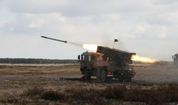Intermarium Weekly 02-07.03.2020

(wikimedia.org)
Coronavirus
On Monday morning (CET), the number of people infected with SARS-CoV-2 coronavirus exceeded 111,000, of which 16 were confirmed in Poland. 3879 people died. Last Tuesday WHO presented research showing that mortality from coronavirus infection is around 3.4%, with the vast majority of deaths being over 80 years of age or with a significantly weakened immune system. Until now, Eastern and Central Europe have been less affected by the virus zone in Europe, but this situation is changing.
One additional element of the coronavirus is that it is becoming a serious factor in the political life of countries, especially if those facing elections in the near future, or where virus becomes a political instrument in the hands of opposition. According to the estimations of SwedBank, the coronavirus can hold back up to 1% of Baltic States’ GDP growth. Moreover, the AirBaltic carrier, for instance, suspended almost 91 flights because of the deadly disease.
Ukraine – another new government…
This week the Ukrainian Parliament appointed a new Prime Minister – Denis Shmygal. He is from Western Ukraine and replaces Alexey Goncharuk, who did not find a way to cooperate with President Zelensky. The new head of government is expected to focus predominantly on the great many economic issues haunting Ukraine, while remaining loyal to President Zelensky. Forecasts indicate Ukraine faces rather bleak economic perspectives in 2020; for example this past week, investment companies Concord Capital and Morgan Stanley have predicted Kiev will face a serious political crisis this year and recommended investors to avoid Ukrainian government bonds. To make matters worse, the Ukrainian Verkhovna Rada (parliament) adopted a decree for the resignation General Prosecutor Ruslan Ryaboshapka.
However, despite the political difficulties in Ukraine, Members of the US Congress were unofficially informed about Pentagon plans to provide Ukraine with additional military assistance worth $125 million, including combat patrol boats. This is the first half of a $250 million security assistance that Ukraine has been allocated from Congress. Simultaneously, the Ministry of Economic Development, Trade and Agriculture estimates a 0.5% fall in gross domestic product in January 2020.
The situation with water in occupied Crimea is still on the political agenda of Ukraine. The newly appointed Prime Minister on his first day in the job stated that the government is considering restoring supplies of water to the peninsula, causing outrage from both sides of the isle, and likely causing a significant loss of his political capital. Eventually, he walked back on his statements, saying that people didn’t understand him correctly. It should be noted that the issue of water for Crimea is a major element of Ukraine’s geopolitical landscape. If Zelensky restores water supplies to Crimea, it would mean that Kiev is ready to make a u-turn, sharply diverging from its current geopolitical position. This is especially true since for the last two months, Ukraine did not seem to mind that Crimea has been effectively cut-off from its water supplies. This week, the State Water Agency of Ukraine noted that due to the “abnormal autumn and winter” of 2019-2020, for the first time in 120 years, Ukraine was in a situation where hydrometeorological conditions could entail a restriction on the rights of consumers to use water. It is unclear how devastating the situation will be in Eastern Europe, but the region’s water and river systems are highly interdependent and can have huge geopolitical consequences.
In the security sphere, Ukraine remains committed to cooperation with NATO. The Verkhovna Rada gave permission to permit the presence foreign military units in the territory of Ukraine in 2020 to participate in multinational exercises, and ratified an agreement with France to support the strengthening of the maritime security and protection of Ukraine. Subdivisions of the armed forces of other states will take part in the Ukrainian-American exercises “Rapid Trident 2020” and “Sea Breeze 2020,” the Ukrainian-Moldovan exercises “South 2020,” the Ukrainian-Romanian exercises “Riverine 2020” and the Ukrainian-British exercises “Warrior Watcher 2020.”
Regarding energy security, Ukraine will seek to conclude a ten-year or twenty-year contract for the supply of large volumes of natural gas from the United States through Poland. In addition to these plans, Ukraine is working on a project of delivering electricity to Belarus and the Russian Federation. Ukraine hopes that such a long-term contract for gas supplies from the United States will strengthen its position in negotiations with Russia. In other news, the Antimonopoly Committee of Ukraine officially granted Swiss company “Risoil SA” permission for the concession of the Kherson Seaport, which lies at the mouth of the Dnieper River as it flows into the Black Sea.
British Forces in a Belarussian Forest…
Strategic signaling by Minsk continued. On Tuesday, President of Belarus Alexander Lukashenko confirmed that Belarus is still intending to look for opportunities to diversify hydrocarbon sources. “We should realise that in the case of energy we can count only on ourselves – in difficult moments even our closest partners will look after their own interests only. Every month, Belarus receives one million tons of oil less than planned (…) and not only because someone is playing with a tap – but because we did not ensure diversification in due time. Monopoly leads to such situations. We have to find suppliers, especially given the complex world situation in which our monopoly partner is also involved. ”
Of course, it is impossible to hide the fact that Lukashenko was alluding to Russia in this case – although, he said, many other countries are also using natural resources to achieve political goals. “Unfortunately, despite bilateral commitments, Belarus has also fallen victim to such practices (…) oil supply conditions are used as a pressure tool and combined with other issues on which the country supplying it depends. This is despite the lack of a legal framework and contrary to the principles and ideas that define our mutual relationships.”
According to Lukashenko, optimal proportions would assume Belarus obtaining 40% of its oil from Russia and the remaining amount on global markets through ports on the Baltic Sea and the port in Odessa. Even more interestingly, Lukashenko recalled Pompeo’s recent statement in which the US Secretary of State declared that his country would allocate one billion dollars to expand transmission infrastructure in the Three Seas. The Belarusian president also hopes that Minsk will obtain low-interest loans for the development of pipelines connecting the Baltic ports with Belarus. The expansion itself, according to Lukashenko, should also take less time than the Belarusian administration initially assumed – not three years, but only a year and a half. What’s more – if you trust the comments of the President of Belneftchim on Tuesday – the creation of a reverse connection between Poland and Belarus on the Druzhba pipeline may be completed before the end of this year.
Let us add that Lukashenko was not the only Belarusian official conducting strategic signaling last week. For example, Belarus’s deputy foreign minister Oleg Kravchenko said that the current rapprochement between Minsk and Washington should not be perceived as being aimed at Moscow. Interestingly, Kravchenko expressed this opinion during a seminar on the priorities of Belarusian foreign policy in the emerging multipolar international order. And because in such a delicate situation Belarus must be like Caesar’s wife, Kravchenko quickly added that this rapprochement should not be seen from the perspective of geopolitics. In his opinion, the rapprochement between Belarus and the US may even serve to repair bad relations between Moscow and Washington and Brussels (Kravchenko also dusted off the concept of “Europe from Lisbon to Vladivostok” forgotten for over a decade).
In turn, the head of the Belarusian Ministry of Foreign Affairs, Vladimir Makej, said that no further work is currently underway on the 31-point road map. According to Makej, “it makes no sense to work on further integration until the oil supply problems are resolved.”
Ending the thread of oil, let us also add that Belarus intends to tie itself to Azerbaijani oil producers with long-term contracts for its supply; according to the Belarusian authorities, in 2020 the Azeris could supply up to a million tonnes of oil to Belarus. Meanwhile, on March 4, the first tanker with a crude oil purchase purchased by Minsk arrived at the port of Klaipeda. On Friday, however, another tanker is expected to reach the port of Odessa, transporting Azerbaijani oil intended for Belarus – we should add that this order is for more oil than was initially stated – 250,000 tons.
The passing week also brought further reshuffles in the Belarusian administration. After the appointment of a new Minister of National Defense and Chief of General Staff in January and February, which represents a castling in the highest positions in the KGB and the Ministry of Interior, deputy prime minister Igor Ljaszenko was dismissed, replaced by Yuri Nazarov. Lukashenko pointed out that the newly appointed deputy prime minister is to be responsible for “the country’s most important petrochemical sector”.
On February 29, soldiers of the 3rd Royal Marines Commando Brigade arrived in Belarus to participate in joint Belarusian-British military trainings under the name “Winter Partisan.” The The Brits will be training vis a vis the 103rd Vitebsk separate airborne brigade. The training will take place at the Losvido training ground near Vitebsk. Russian propaganda is particularly keen on emphasizing the fact that this British division participated in NATO’s military operation against Yugoslavia in 1999.
British troops will spend the next two weeks in Belarus; it is worth adding that last year Belarusian soldiers took part in similar exercises in Wales.
As Lukashenko himself noted, in the context of oil, the situation of Belarus has become somewhat simpler thanks to the peak prices of this raw material.
Minsk is attempting to balance this with cooperation with the Collective Security Treaty Organization. In the period from March 3 to March 5, together with other members of CSTO, Belarus agreed for consultations which were held at the Joint Headquarters of the Organization on the issue of improving joint training of command. They also agreed to control bodies and forces of the CSTO and a working meeting of representatives of the defense departments of the CSTO member states on organizing events of this direction in 2020. This year the CSTO is planning to conduct five military exercises.
Moreover, the Eurasian Intergovernmental Council with the participation of the Prime Ministers of the countries of the Eurasian Economic Union is scheduled for April 10 in Minsk. The main topic of their meeting will be the discussion of the draft of the Eurasian integration strategy until 2025.
The State Oil Company of Azerbaijan (SOCAR) will send an oil tanker to Belarus from the Turkish port of Ceyhan. The concern specified that raw materials will be supplied via the Odessa-Brody pipeline. The volume of oil will be about 85 thousand tons. The company previously reported that on March 20 it was planned to ship an oil tanker from the Georgian port of Supsa to the Belneftekhim concern, which also has a volume of about 85 thousand tons and which again will be delivered to Odessa.
Refugees are coming again…
The greatest concern of Bulgaria and Romania was the escalation of the Middle Eastern crisis in Syria over Idlib and the resulting decision, courtesy of Recep Erdogan policy of weaponizing refugees to open the borders to Asian and African migrants in order to blackmail the European Union. Both Bulgaria and Romania are concerned that they can be the next countries after Greece to face thousands of migrants at their borders. Romania’s Interior Minister, Marcel Vela, warned this week that his country can only accommodate up to 1,300 migrants now, but could possibly double the number– even so, this is merely a drop in the ocean of the endless mass of refuges amassed in Turky . Turkey currently hosts over 3.6 million registered Syrian refugees.
The Baltic States
In Vilnius, the representative of French President Emmanuel Macron on strategic dialogue with Russia, Pierre Vimon, held consultations with Lithuanian politicians and diplomats. The French president insists, that Europe, while remaining demanding and adhering to its principles, should re-enter the strategic dialogue with Russia. Lithuania does not share this position and calls for isolating Russia until it changes its aggressive behavior in neighboring territories and the Middle East. The French diplomatic activities are related to Macron’s vision of greater geopolitical importance of France and the EU in the new international order.
From March 2 to 13, international military exercises Kristāla bulta 2020 (“Crystal Arrow 2020”) will be held in the Riga region of Latvia, during which the size of the NATO multinational group in Adazi will be expanded. According to the Ministry of Defense of Latvia, in the course of the exercises, coordination of various units of the multinational group will be worked out.
Poland’s territorial defence units to receive US made ATGM’s
The Polish army can replenish its arsenals with American anti-tank missile systems (ATGMs) Javelin. This became known after the United States Department of Defense Security Cooperation Agency (DSCA) officially notified the US Congress on the sale of these weapons to Poland on March 4. Recall that the delivery of these anti-tank systems to Poland had already been approved by the US State Department as part of the Foreign Military Sales program. The U.S. State Department has approved the potential $100 million sale to Poland of 180 Javelin anti-tank guided missiles and associated equipment. The first batch of Javelin systems was delivered to Estonia in September 2015 and to Georgia in 2018.
Autor
Ridvan Bari Urcosta
Senior Analyst at Strategy&Future






Trwa ładowanie...